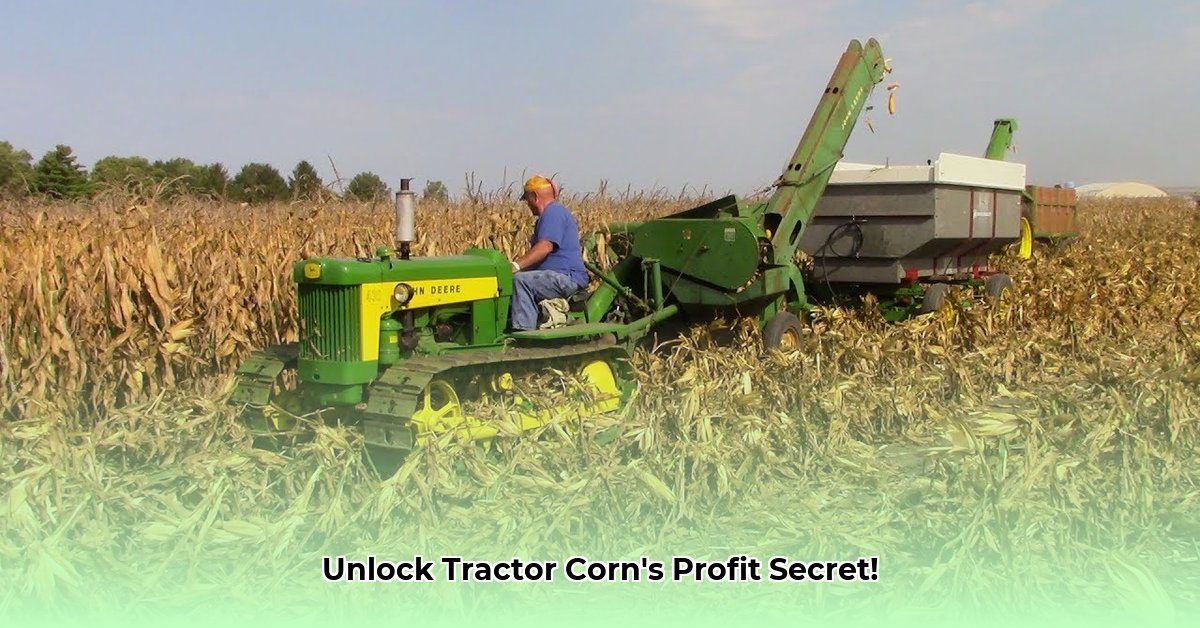
Tractor Corn: A Sustainable Future for Farming and Food
Ever picture a future where feeding livestock doesn't harm the planet? That's the promise of sustainable tractor corn. It's not just about environmentally friendly practices; it's about building a robust, profitable agricultural system that thrives for generations. This isn't a niche concept—the demand for high-quality, sustainably produced animal feed is exploding, with major retailers like Rural King and Tractor Supply leading the charge. Learn more about efficient planting with tractor planters. Let's explore how farmers, businesses, and consumers can work together to cultivate a greener, more profitable future.
The Booming Market for Sustainable Livestock Feed
The market for corn, especially for animal feed, is experiencing explosive growth. The increasing global demand for meat and dairy products fuels this expansion, creating a massive opportunity for farmers who can supply high-quality, sustainably produced corn. But there's a critical caveat: this growth must be responsible. Concerns about the environmental impacts of conventional corn farming are escalating, making sustainable practices not only ethically desirable but also commercially advantageous. This is where sustainable tractor corn farming steps in, offering a solution that addresses both the growing demand and the pressing environmental concerns.
Growing Green: Minimizing the Environmental Footprint
Traditional corn production takes a considerable toll on the environment. Heavy pesticide use harms beneficial insects and pollutes waterways, while excessive water consumption strains already-stressed resources. However, sustainable practices offer a compelling alternative. These methods don't just protect the environment; they often lead to improved yields and reduced costs over the long term. Healthy soil, for instance, supports robust plant growth and larger harvests, creating a virtuous cycle. It's about aligning farming practices with natural processes, achieving both environmental sustainability and economic success.
Sustainable Tractor Corn: A Practical Guide to Greener Farming
How can we cultivate more corn without sacrificing the planet's health? It requires a multifaceted approach, involving everyone from the farmer to the consumer:
Prioritize Quality: Maintain rigorous standards for corn quality, ensuring consistent nutritional value for livestock. Impurities reduce feed effectiveness and can harm animals. Uniformity in size and dryness is crucial for efficient processing and storage.
Sustainable Sourcing: Actively seek suppliers committed to eco-friendly practices. Transparency is paramount; understanding the origin and cultivation methods of your corn builds consumer trust.
Embrace Precision Agriculture: Technologies like GPS-guided planting and variable-rate fertilization optimize resource use, minimizing waste, lowering costs, and reducing environmental impact. These techniques tailor inputs to the specific needs of each field section, improving efficiency and sustainability.
Invest in Research and Innovation: Support the development and adoption of new corn varieties that are more resistant to pests, diseases, and climate change. These advances contribute to reduced water and pesticide use.
Government Support and Policy: Incentivize sustainable farming through policies and subsidies. This could involve financial support for efficient irrigation or environmentally friendly pesticides. Aren't government incentives vital for driving widespread adoption of sustainable practices?
Navigating the Challenges: Risk Assessment and Mitigation
Sustainable farming, like any business endeavor, presents risks. Let's examine key challenges and strategies for mitigation:
| Risk Factor | Probability | Impact | Mitigation Strategy |
|---|---|---|---|
| Corn Price Volatility | High | High | Diversify crops; explore crop insurance; utilize futures contracts. |
| Supply Chain Interruptions | Medium | Medium | Develop multiple sourcing channels; build strong, reliable partnerships. |
| Consumer Demand for Sustainability | Medium to High | Medium to High | Transparent communication; education initiatives; certifications. |
| Climate Change Impacts | High | High | Drought-resistant varieties; improved water management techniques. |
The Future is Green: A Call to Action
The future of agriculture rests on our ability to adopt sustainable practices. Sustainable tractor corn represents responsible stewardship of land and resources—an investment in a healthier planet and a more prosperous agricultural sector. The demand for sustainable feed is undeniable. Are you ready to be a part of this positive transformation? Let's collaborate to build a greener, more profitable agricultural future.
Key Takeaways:
- Sustainable corn production is crucial for minimizing environmental impact while ensuring the high-quality feed needed for a growing global population.
- Adopting sustainable practices like no-till farming and cover crops significantly reduces environmental damage while potentially boosting yields.
- Transparent traceability systems are vital for verifying the sustainable nature of corn supply chains. Governments, NGOs, and consumers all have key roles to play in promoting sustainable practices and holding producers accountable for their environmental impact.